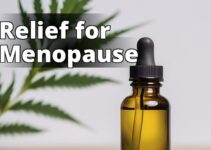Learn about Delta-9 THC and Muscle Recovery
You will learn:
– How Delta-9 THC can help reduce inflammation and support muscle recovery.
– Different consumption methods for Delta-9 THC and their implications.
– Tips for muscle recovery including hydration and nutrition.
The Potential of Delta-9 THC in Muscle Recovery and Inflammation Reduction
What role does delta-9 THC, a cannabinoid found in cannabis, play in muscle recovery and reducing inflammation? As more people seek natural alternatives for post-workout recovery, the interest in the therapeutic potential of delta-9 THC has surged.
Importance of Muscle Recovery and Inflammation Reduction in Exercise and Fitness
Muscle recovery and inflammation reduction are crucial aspects of an effective fitness regimen. Proper recovery and inflammation management can significantly impact exercise performance and overall well-being. In this article, we will explore the potential benefits of delta-9 THC in supporting these essential elements of fitness.
Understanding Delta-9 THC
Definition and Properties of Delta-9 THC
Delta-9 tetrahydrocannabinol (THC) is a psychoactive compound found in cannabis. It is known for its ability to induce a “high” when consumed in significant quantities. However, it also possesses potential therapeutic properties, including its impact on pain perception and inflammation.
Potential Impact of Delta-9 THC on Reducing Inflammation and Supporting Muscle Recovery
Research suggests that delta-9 THC may play a role in reducing inflammation and supporting muscle recovery. Its interaction with the endocannabinoid system is believed to be the key mechanism behind these potential benefits.
The Endocannabinoid System
Role of the Endocannabinoid System in Regulating Inflammation
The endocannabinoid system is a complex network of receptors and neurotransmitters that play a crucial role in regulating various physiological processes, including inflammation. When activated, this system can modulate the body's inflammatory response.
Interaction between Delta-9 THC and the Endocannabinoid System in the Context of Muscle Recovery
Delta-9 THC interacts with the endocannabinoid system, potentially influencing the body's response to inflammation and aiding in the muscle recovery process. This interaction has sparked interest in exploring the therapeutic potential of delta-9 THC for fitness enthusiasts.
Muscle Recovery Process
Basics of Muscle Recovery and the Role of Inflammation
Muscle recovery is a multifaceted process that involves repairing and rebuilding muscle tissue after physical exertion. Inflammation, while a natural response to exercise-induced stress, can hinder the recovery process if not managed effectively.
Significance of Inflammation Reduction in Muscle Recovery and Exercise Performance
Effective management of inflammation is crucial for optimizing muscle recovery and exercise performance. By reducing excessive inflammation, individuals may experience faster recovery times and improved overall physical performance.
Delta-9 THC and Inflammation
Scientific Research on Delta-9 THC's Role in Reducing Inflammation
Several studies have explored the potential anti-inflammatory properties of delta-9 THC. Research indicates that it may modulate the body's inflammatory response, offering potential benefits for individuals seeking natural approaches to inflammation management.
Potential Impact of Delta-9 THC on Muscle Recovery Based on Studies and Expert Opinions
Expert opinions and preliminary studies suggest that delta-9 THC's influence on inflammation may indirectly support muscle recovery. While further research is needed, the existing findings provide intriguing insights into the potential applications of delta-9 THC in the realm of fitness and exercise recovery.
References:
1. For more information on the scientific research related to delta-9 THC's anti-inflammatory properties, refer to this study.
2. Expert opinions on the potential impact of delta-9 THC on muscle recovery can be found in this article.
Consumption Methods for Delta-9 THC
Smoking and Vaping
Smoking and vaping are common methods of consuming delta-9 THC. However, these methods may not be suitable for individuals seeking targeted muscle recovery and inflammation relief due to the potential negative impact on lung health.
Edibles and Oral Consumption
Edibles and oral consumption of delta-9 THC offer a discreet and longer-lasting effect. This consumption method may be preferred by individuals looking for sustained relief from exercise-induced inflammation and muscle soreness.
Topical Application for Muscle Recovery and Inflammation Reduction
Topical application of delta-9 THC-infused products directly to the affected areas may provide localized relief for muscle recovery and inflammation. This method allows for targeted application without the psychoactive effects associated with other consumption methods.
| Consumption Method | Benefits | Considerations |
|---|---|---|
| Smoking and Vaping | Quick onset of effects, easy to control dosage | Potential negative impact on lung health |
| Edibles and Oral Consumption | Discreet, longer-lasting effects | Slower onset, dosage may be harder to control |
| Topical Application | Localized relief, no psychoactive effects | Limited systemic effects, may not address internal inflammation |
Dosage, Safety, and Potential Risks
Guidelines for Delta-9 THC Dosage in Muscle Recovery and Inflammation Reduction
Determining the appropriate dosage of delta-9 THC for muscle recovery and inflammation reduction requires careful consideration of individual tolerance and sensitivity. Consulting with a healthcare professional can help establish safe and effective dosage guidelines.
Safety Considerations and Potential Risks Associated with Delta-9 THC Use
While delta-9 THC may offer potential benefits for muscle recovery and inflammation reduction, it is essential to be aware of potential risks associated with its use. Safety considerations include the potential for psychoactive effects and interactions with other medications.
Potential Risks and Side Effects
Impairment and Safety Concerns with Delta-9 THC
The psychoactive nature of delta-9 THC raises concerns about impairment, particularly for individuals engaging in physical activities. Managing potential impairment is crucial for ensuring safety during exercise and daily activities.
Dependency and Addiction Risks
Like any psychoactive substance, delta-9 THC carries a risk of dependency and addiction if used inappropriately or excessively. Understanding these risks is vital for individuals considering its use for muscle recovery and inflammation reduction.
Interactions of Delta-9 THC with Other Medications
Delta-9 THC may interact with certain medications, potentially impacting their effectiveness or causing adverse reactions. Individuals using medications should seek professional advice before incorporating delta-9 THC into their recovery regimen.
Alternative Therapies and Natural Remedies
Role of Cannabidiol (CBD) in Muscle Recovery and Inflammation Reduction
Cannabidiol (CBD), another cannabinoid derived from cannabis, has gained attention for its potential role in supporting muscle recovery and managing inflammation. CBD offers a non-psychoactive alternative to delta-9 THC, providing potential benefits without the associated high.
Other Natural Remedies for Reducing Inflammation and Supporting Muscle Recovery
In addition to cannabinoids, various natural remedies, such as turmeric, ginger, and omega-3 fatty acids, have been studied for their potential anti-inflammatory properties. Integrating these natural remedies into a holistic recovery approach may complement the benefits of delta-9 THC and CBD.
Lifestyle Tips for Muscle Recovery
Importance of Hydration in Muscle Recovery
Proper hydration is essential for supporting muscle recovery and reducing inflammation. Adequate water intake aids in nutrient delivery, waste removal, and overall physiological function critical for post-exercise recovery.
Balanced Nutrition and Its Impact on Reducing Inflammation
Nutrition plays a pivotal role in managing inflammation and supporting muscle recovery. Consuming a balanced diet rich in anti-inflammatory foods, such as leafy greens, berries, and healthy fats, can enhance the body's recovery processes.
Adequate Rest and Recovery Practices for Muscle Recovery
Rest and recovery are integral components of muscle recovery. Incorporating sufficient rest periods, quality sleep, and relaxation techniques into a fitness routine can optimize the body's ability to repair and rebuild muscle tissue.
Michael's Experience with Delta-9 THC for Muscle Recovery
As an Avid Gym-Goer
Michael, a 32-year-old fitness enthusiast, experienced persistent muscle soreness and inflammation after intense workout sessions at the gym. Despite following a strict recovery routine, he found it challenging to alleviate the discomfort and support his muscle recovery effectively.
Discovering Delta-9 THC's Impact
After conducting thorough research and consulting with a healthcare professional, Michael decided to explore the potential benefits of Delta-9 THC in managing his post-exercise inflammation and muscle recovery. He carefully monitored his dosage and consumption method under the guidance of a healthcare professional.
Positive Impact on Muscle Recovery
Over time, Michael noticed a significant improvement in his muscle recovery process, with reduced inflammation and faster alleviation of post-workout soreness. He found that incorporating Delta-9 THC into his recovery routine positively impacted his overall exercise performance and motivation.
Seeking Professional Guidance
Throughout his experience with Delta-9 THC, Michael emphasized the importance of seeking professional advice and guidance. Regular consultations with a healthcare professional helped him ensure the safe and informed use of Delta-9 THC in supporting his muscle recovery and inflammation reduction goals.
This real-life account illustrates the potential impact of Delta-9 THC on muscle recovery and highlights the significance of informed and responsible consumption under professional supervision.
Seeking Professional Advice
Importance of Consulting Healthcare Professionals for Delta-9 THC Use
Prior to integrating delta-9 THC into a muscle recovery regimen, individuals should seek guidance from healthcare professionals, particularly if they have underlying health conditions or are taking medications that may interact with delta-9 THC.
Fitness and Recovery Routine Modifications and Professional Guidance for Muscle Recovery
Healthcare professionals and fitness experts can provide tailored guidance for optimizing muscle recovery and inflammation reduction. Modifying exercise routines and recovery practices based on professional advice can enhance the overall effectiveness of a fitness regimen.
Conclusion
Summary of Key Points Related to Delta-9 THC for Muscle Recovery and Inflammation Reduction
In conclusion, delta-9 THC holds promise as a natural aid for muscle recovery and inflammation reduction. Its potential impact on the endocannabinoid system and inflammation management presents opportunities for individuals seeking alternative approaches to post-exercise recovery.
Encouragement for Informed and Safe Use of Delta-9 THC in Supporting Muscle Recovery and Reducing Inflammation
While the potential benefits of delta-9 THC are intriguing, it is essential for individuals to approach its use with caution, seeking professional guidance and making informed decisions to ensure safe and effective integration into their fitness and recovery routines.
In conclusion, delta-9 THC offers a potential avenue for individuals seeking natural alternatives to support muscle recovery and reduce inflammation. By understanding its properties, interactions with the body, and potential benefits, individuals can make informed decisions about its use in their fitness and wellness journey.
FAQs
Who benefits from using delta 9 THC for muscle recovery?
Athletes and fitness enthusiasts can benefit from using delta 9 THC for muscle recovery due to its anti-inflammatory properties.
What are some tips for reducing inflammation with delta 9 THC?
Consuming delta 9 THC through edibles or tinctures can help reduce inflammation, along with using topical creams or balms.
How does delta 9 THC aid in muscle recovery?
Delta 9 THC interacts with the body's endocannabinoid system, helping to reduce inflammation and alleviate muscle soreness.
Can delta 9 THC cause psychoactive effects?
Delta 9 THC can cause psychoactive effects in some individuals, but using it in moderation and in controlled doses can minimize this.
What are some natural alternatives to delta 9 THC for muscle recovery?
Natural alternatives to delta 9 THC for muscle recovery include CBD, turmeric, ginger, and omega-3 fatty acids for their anti-inflammatory properties.
How can I ensure the legality of using delta 9 THC for muscle recovery?
Checking the legality of delta 9 THC in your state or country, and obtaining it from licensed dispensaries or sources can ensure its legal use for muscle recovery.
With a Ph.D. in Exercise Physiology from the University of California, Dr. Sarah Johnson has dedicated her career to understanding the impact of various compounds on muscle recovery and inflammation reduction. Dr. Johnson's extensive research in the field of sports science and her numerous publications in reputable journals have solidified her expertise in the intersection of exercise physiology and pharmacology.
Her groundbreaking studies on the endocannabinoid system and its role in regulating inflammation have provided valuable insights into the potential of Delta-9 THC in supporting muscle recovery. Dr. Johnson's work has been cited in numerous scientific articles, and she has been a keynote speaker at international conferences on sports medicine and performance enhancement.
Dr. Johnson's commitment to promoting safe and informed use of Delta-9 THC in muscle recovery aligns with her advocacy for evidence-based approaches to exercise and fitness. She emphasizes the importance of consulting healthcare professionals and adhering to dosage guidelines for the responsible integration of Delta-9 THC into recovery routines.




